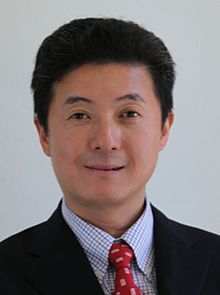Shoucheng Zhang
Shoucheng Zhang (Chinese 张首晟, pinyin Zhāng Shǒuchéng, also: Shou-Cheng Zhang; * February 15, 1963 in Shanghai, People's Republic of China; † December 1, 2018) was a US theoretical solid-state physicist of Chinese origin. His family was from the city of Gaoyou in China's Jiangsu Province. Zhang attended Fudan University in Shanghai from 1978 and went to Germany in 1980 for further studies.
Zhang studied at FU Berlin, graduating in 1983, and received his Ph.D. from the State University of New York at Stony Brook in 1987. As a post-doctoral researcher, he was at the Institute for Theoretical Physics (ITP) at the University of California, Santa Barbara until 1989. From 1989 to 1993 he was at the IBM Almaden Research Center, and from 1993 he was a professor of physics at Stanford University. Since 2003, he has been co-director of the IBM-Stanford Center for Spintronics Science and Application Center there.
He worked on spintronics and the quantum spin Hall effect (which he proposed independently of Charles L. Kane with B. Andrei Bernevig in 2006)) as a prototype of topological insulators, that is, insulators with topological conduction states at the surface. He also proposed with Andrei Bernevig a realization of the quantum spin Hall effect in quantum wells (sandwich structures of mercury-tellurium layers between cadmium-tellurium layers), where they were also experimentally demonstrated in 2007. He also deals with high-temperature superconductors, where he developed an SO(5) theory that describes in a unified way both their antiferromagnetic and superconducting properties.
With Shuichi Murakami and Naoto Nagaosa, he proposed an intrinsic spin Hall effect in 2003, independently of a group led by Allan H. MacDonald and Jairo Sinova.
In 1993 he received the Outstanding Innovation Award from IBM. In 2012 he received the Dirac Medal (ICTP) (with F. Duncan M. Haldane and Charles L. Kane in particular for their pioneering work on two - and three-dimensional topological insulators) and the Oliver E. Buckley Condensed Matter Prize. In 2010, he received the Europhysics Prize. Since 2011, he has been a member of the American Academy of Arts and Sciences, and he is a member of the American Association for the Advancement of Science. In 2007 he was a Guggenheim Fellow and in 2006 he became a Fellow of the American Physical Society. In 2013, he received the Physics Frontiers Prize. For 2015, he was awarded the Benjamin Franklin Medal from the Franklin Institute. Also in 2015, he was elected to the National Academy of Sciences. In 2016, he received an honorary doctorate from the Julius Maximilian University of Würzburg.

Shoucheng Zhang, Stanford, 2011
Writings
- with Xiao-Liang Qi: The Quantum Spin Hall Effect and Topological Insulators, Physics Today, January 2010, Arxiv
Search within the encyclopedia